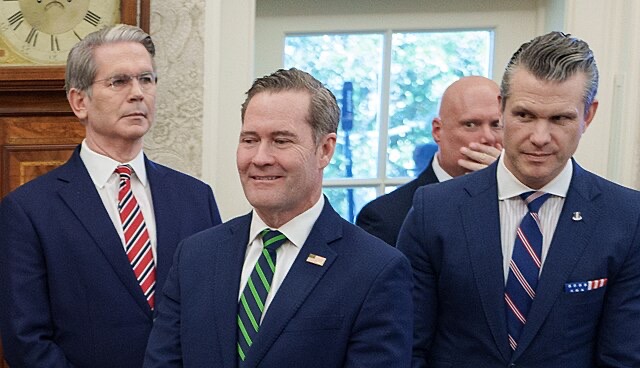In a dramatic turn inside the Trump White House, National Security Adviser Mike Waltz has resigned just months into his tenure, alongside his deputy Alex Wong, following a leaked internal chat and rising internal tensions. The high-level exits raise urgent questions about national security oversight, internal loyalty struggles, and the growing influence of fringe political actors on U.S. policy decisions.
Who Is Mike Waltz?
Mike Waltz, a decorated Army Green Beret and former Republican congressman from Florida, was appointed by Donald Trump as National Security Adviser in early 2025. Known for his hawkish views on foreign policy and sharp stance against China and Iran, Waltz was expected to bring military discipline to Trump’s second-term national security team.
Key Policies and National Security Approach
During his brief tenure, Waltz focused on:
- Revamping U.S. cyber defense protocols
- Bolstering military readiness in the Indo-Pacific
- Tightening coordination with Israel and NATO
- Hardening U.S. immigration security policies linked to border threats
His resignation now leaves a vacuum at the top of one of the most sensitive arms of government.
What Sparked the Resignations?
The breaking point came after Waltz reportedly included journalist Jeffrey Goldberg—editor-in-chief of The Atlantic—in a Signal group chat where senior officials were discussing U.S. military operations in Yemen. The accidental breach sent shockwaves through the administration and sparked immediate internal reviews.
Inside the Signal Chat Blunder
Sources say Goldberg, though quickly removed, saw several sensitive exchanges before being noticed. The episode raised alarms about operational security protocols under Waltz’s leadership. While the content wasn’t classified per se, its leak exposed vulnerabilities in how national security data is shared—even digitally.
The Role of Far-Right Influencer Laura Loomer
Adding to the turbulence, multiple reports confirm that right-wing commentator Laura Loomer, an ally of Trump but holding no official post, influenced recent firings within the National Security Council (NSC). She allegedly branded several NSC staffers as “disloyal” and advocated their dismissal—a move insiders claim undermined morale and increased tension with Waltz.
Loomer’s outsized influence in decision-making has raised eyebrows across the political spectrum.
The Resignations and Aftermath
Waltz and Wong’s resignations were confirmed on May 1, 2025. No official cause was cited, but insiders say the combined pressure from the Signal scandal and Loomer-fueled reshuffles made the situation “untenable.”
The White House has not named successors, and officials are scrambling to stabilize leadership in a department tasked with coordinating America’s defense and global strategy.
Implications for U.S. National Security Strategy
The departure of two senior figures so close together suggests major internal fractures within Trump’s national security apparatus. With major conflicts ongoing and a volatile geopolitical climate, the sudden leadership vacuum could delay key decisions on:
- Military support for Ukraine
- Taiwan defense strategy
- Ongoing talks with NATO
- Counterterrorism in the Middle East
Experts warn of a “confidence gap” inside the U.S. intelligence community as operational trust takes a hit.
Reaction from Lawmakers and Experts
While Trump loyalists have praised Waltz’s service, many lawmakers—on both sides—have expressed concern over the chaos.
Senator Tammy Duckworth (D-IL), a veteran and defense committee member, called the incident “a national embarrassment.” Meanwhile, Senator Tom Cotton (R-AR) blamed “deep-state bureaucracy” and “internal sabotage” for undermining Waltz.
Policy analysts say this marks a low point in White House national security management since the early Trump years.
What Happens Next?
The search for a replacement is expected to focus on:
- Candidates with both military and intelligence backgrounds
- Those loyal to Trump’s ‘America First’ ideology
- Individuals less prone to internal controversy
But analysts warn that rapid turnover and increasing ideological purges within the administration could drive away qualified candidates—leaving America’s top security post exposed in a pivotal election year.
Conclusion
Mike Waltz’s resignation, born from a mix of technical failure, internal politics, and ideological warfare, underscores the fragility of national security operations in today’s hyper-politicized environment. As America faces external threats and internal disarray, the question remains: Who will step in to lead—and will they last?
FAQs
Q1: Why did Mike Waltz resign as National Security Adviser?
A: He resigned following a scandal involving a Signal group chat and growing internal friction with political influencers in the administration.
Q2: What was the Signal chat incident?
A: Journalist Jeffrey Goldberg was mistakenly added to a group chat involving sensitive national security discussions about Yemen.
Q3: Who is Laura Loomer, and what is her role in this?
A: Loomer is a far-right activist reportedly advising Trump informally. She pushed for dismissing NSC staff she deemed disloyal.
Q4: Who is expected to replace Waltz?
A: No successor has been named yet. The White House is expected to choose a loyalist with national security credentials.
Q5: What does this mean for U.S. national security?
A: It raises concerns about leadership stability, operational security, and the administration’s ability to respond to global threats.



